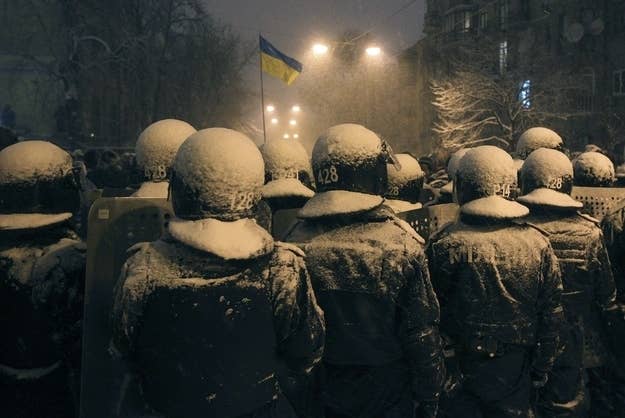
Ukrainian riot police and anti-government protesters engaged in an hours-long dance in the early hours of Kiev Wednesday. The police, clad in helmets and protected by riot shields, moved to dismantle the tents and barricades that had come to mark a weeks-long protest against the government of President Viktor Yanukovych. Protesters pushed back. The dance, long and winding and fraught with tension, was, however, largely non-violent, considering the show of force in the streets.
Yanukovych's decision to send in riot police to shatter the camp after midnight on Tuesday was bold. It came hours after the EU's foreign policy chief, Catherine Ashton, toured Kiev's Maidan, its central square and the protest hub, to rapturous applause. Victoria Nuland, the U.S. Assistant Secretary of State for European and Eurasian Affairs, had also visited the city hours before. His show of force was likely directed as much at them as at the protesters who have been shouting for his removal — a sign to show who is in charge.
The day mirrored the Ukrainian leader's long dance with both the EU and Russia. He sent in the riot police, but held them back from inflicting violence that was widely expected (the decision to violently disrupt a protest a couple of weeks ago has spurred ever more people into the streets) to shut down the protest camps entirely. Similarly, Yanukovych has avoided for years from deciding which way he wants the country to go — toward further integration with the West; or back into the arms of Russia, Ukraine's Soviet-era master.
There are many people — many Ukrainians first and foremost among them — who would argue that Ukraine should not have to choose. But that discounts the approach of a central player in the drama: Russian President Vladimir Putin, who sees all games as zero-sum, all interactions as winners vs. losers. It recalls an old Russian anecdote that basically says: it's not good enough to be doing well on your own, you're only really winning if your neighbor starts doing badly.
For months, Yanukovych appeared to signal he would move to try and sign an association agreement with the European Union, something that would increase ties between Kiev and Brussels but not a document that would put Ukraine on the path to EU membership. EU officials had long said that Yanukovych would not be able to sign unless he released Yulia Tymoshenko, a former prime minister and his chief political rival, currently sequestered away in a prison hospital as she serves a term on charges of abuse of office — something widely seen as political retribution.
Late last month, Yanukovych abruptly halted plans to sign the association agreement, sending tens of thousands of Ukrainians into the streets. A violent crackdown on one of those protests only fueled their anger. Almost overnight, the belief of millions of Ukrainians — that they were, in fact, part of Europe — was shattered.
Many opposition activists were under no illusions about what that meant. Speaking from the protest stage early on Wednesday, one opposition speaker addressed the crowd alternately in Ukrainian and English and said: "We want to be independent. We don't want to go to Russia!" Earlier, Lenin statues — the ultimate symbol of Russian influence in the country — were torn down.
Ukraine, already economically fragile, now stands on a precipice. Economists estimate that it needs $10 billion in the near future in order to stay afloat — it has failed to reach a deal with the International Monetary Fund, which requires structural reforms in exchange for loans. Yanukovych's decision to spurn the EU was in part motivated by Russian moves at economic retribution (Russia wants Kiev to join a Kremlin-led customs union instead). Now, Moscow will likely step in with economic aid — either in the form of lower gas prices, or a rumored loan.
Ukraine stands at the very heart of Putin's project to revive his country's imperial reach. In late October, Armenia joined the Kremlin's customs union, alongside longtime members Belarus and Kazakhstan. Putin visited Yerevan, the Armenian capital, earlier this month to mark the event — and protests against him were brutally dispersed.
The Russian president, full of bravado from a series of foreign policy successes — his statesmanship over Syria high among them — has now begun lashing out beyond Moscow's borders to build on those wins. The Obama administration has taken the position of "ignoring" Moscow as much as possible. That is, they rightly argue, the easiest way to anger Putin. It is also the easiest way to allow Putin to spread his influence.
Whether Yanukovych will survive this round of protests — and any protests that would undoubtedly accompany any attempt to join the customs union — remains to be seen. The dance on Maidan continues.
